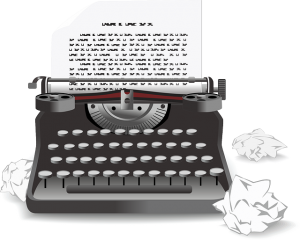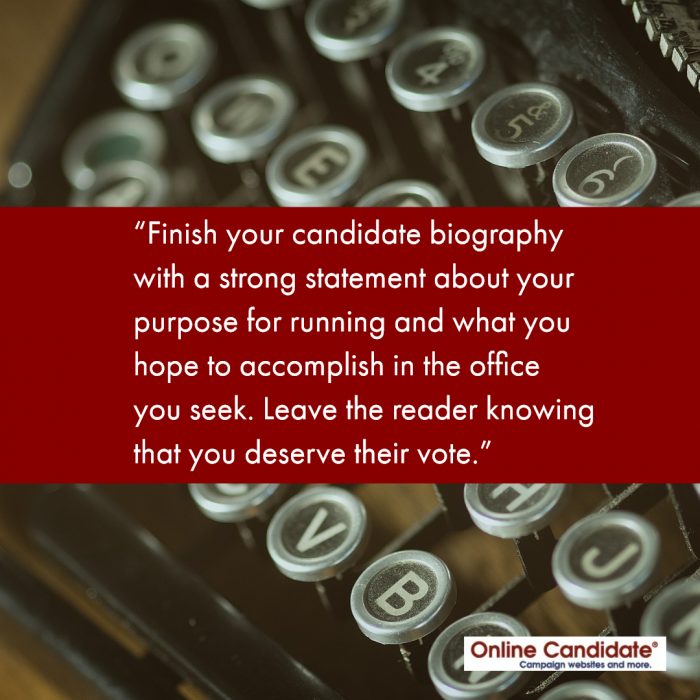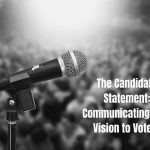Anyone running for office needs to write a political candidate biography. A good story adds a personal touch to your campaign. It provides information about your background, qualifications, and your positions on important issues.
Your candidate biography is a profile about yourself. It’s where you introduce yourself as a political candidate and persuade voters that you are not only on the right side of the issues but also the right person for the elected position. Your bio should provide both a compelling story and an interesting read. Done properly, it will help establish credibility and legitimacy, which are important in convincing voters to support you.
If you want to learn how to write a solid political profile or candidate statement, read on!
How to introduce yourself as a political candidate
Who are you? Begin with some background information about yourself. Try to include some qualities that separate you from your opposition. Keep your political bio positive and touch on some issues that are of concern to voters.
[bctt tweet=”Your candidate biography should provide a compelling story and be an interesting read. via @onlinecandidate”]
Describe your personal experience
What experiences in your personal, professional, or within a member organization have helped shape you and made you the person you are today? Discuss your education, job titles, community and civic work, awards, and other offices you’ve held. How do those experiences translate into you being the best and most qualified candidate?
Don’t just create a laundry list of accomplishments, but work your experience into a larger narrative. You control the narrative, so make your biography statements informative, interesting, and educational.
 Add relevant details about yourself
Add relevant details about yourself
A little bit about you personally goes a long way. Voters want to know about you, but maybe not every detail of your life. Include photos or even video from member organization events or initiatives you’ve been a part of. Both personal and professional content helps provide a rounded idea of who you are. It’s a bit like writing an autobiography, but just using the good stuff.
Include any endorsements you’ve secured. Have you won awards or been recognized by community organizations? Use those outside sources to help sell you on your desired position or office. It’s easy to say great things about yourself, but when others do it, that carries a lot more weight.
What is it that you want to accomplish in office?
What do you want to accomplish during your time in office? Perhaps your goals can relate to previous accomplishments in your life. Use specific examples in your profile. Take a situation, describe how you effectively handled it, and use it as a template for this section.
- Take a stand on your most important issue and expand on it.
- What are your solutions or plans for tackling the issue?
- How do your plans differ from those of your opponent or from the way the issue is being handled currently?
Even more importantly, what’s in it for the voter? For example, how will your policies make a difference in the community and the lives of the voters? What will inspire people to join and support your cause? Be detailed in your initiatives and spell out how they relate to the voter.
Easy to start, easy to use. Hosting and domain included.
Sign up now and start your campaign website in minutes.
What makes you the right person for the elected position?
This is where it all comes together. A political biography does not have to be particularly long. 400-500 words should be long enough to get the major points across. Here are some questions you should answer:
- You know the issues, and you have the background, but what makes you the right person for the job?
- How does your experience relate to the elected position? Have you worked with organizations or other government entities?
- What skills can you apply toward your goals? Showcase personal, organizational, or professional skills that will help you perform your duties.
- Back up your claims. This is a good place to reveal endorsements from community organizations or influential people. Have you won awards or professional achievements?
End your candidate statement on a strong note
Finish your candidate election biography with a strong statement about your purpose for running and what you hope to accomplish in the office you seek. Be inspirational in your summary. Be specific about the issues you hope to tackle. Leave the reader knowing that you deserve their vote on Election Day.
Find sample biography examples at OnlineCandidateResources.com.
First or third person presentation for the web?
Some candidates prefer to write their bios in the third person, others in the first. While the first person may come across as more personal, that format is not very useful if you are trying to optimize your content for the search engines. Google doesn’t know who “I” and “me” are. Writing in the third person gives your candidate statement plenty of opportunity to use your full name, which can help the material appear in search engine results for people searching for your name.
Candidate video presentation
A written bio can be translated into video. Many candidates create an introduction video, speaking directly to voters about their vision for the office, who they are, and why they want to represent the people. Videos can be added to their website and shared on social media accounts including Facebook, Instagram, YouTube, and even segments on TikTok.
Another example is a replay of a “meet the candidate” event, where the video includes your introduction and some questions and answers that help tell your story. This video should be edited to make it more concise.
Have your candidate’s biography proofread
Have others you trust read drafts of all your site content to check for grammar, spelling, and content. Others will see your work with fresh eyes and will be able to provide valuable feedback.

Break your bio down for your elevator pitch
Now that you have written a full candidate biography, it’s time to break it down. You should create a concise version for your “elevator pitch”. An elevator pitch is a short description of yourself that explains who you are so that a listener will learn the basics about you very quickly. It should be no longer than 20 to 30 seconds long. It should basically state who you are and what you want to do.
You can also take written sections of your bio and rework them for use in other campaign materials, such as brochures, flyers, mailings, and your website’s media kit. You will even want to incorporate elements into your speeches and public presentations.
These steps will help you write a great campaign biography. A strong candidate statement is the cornerstone of informing the voting public of your background, beliefs, and goals.
Now, get writing!
Recommended Reading: Political Candidate Profile and Biography Worksheet [PDF]
« Choosing the Best Political Campaign HandleHow to Build a Winning Political Campaign Team »








